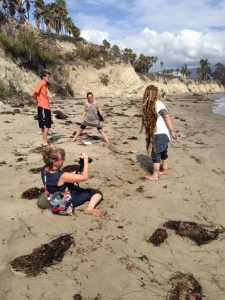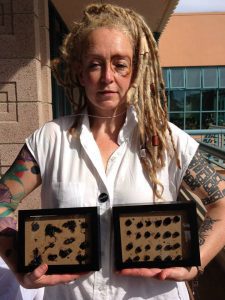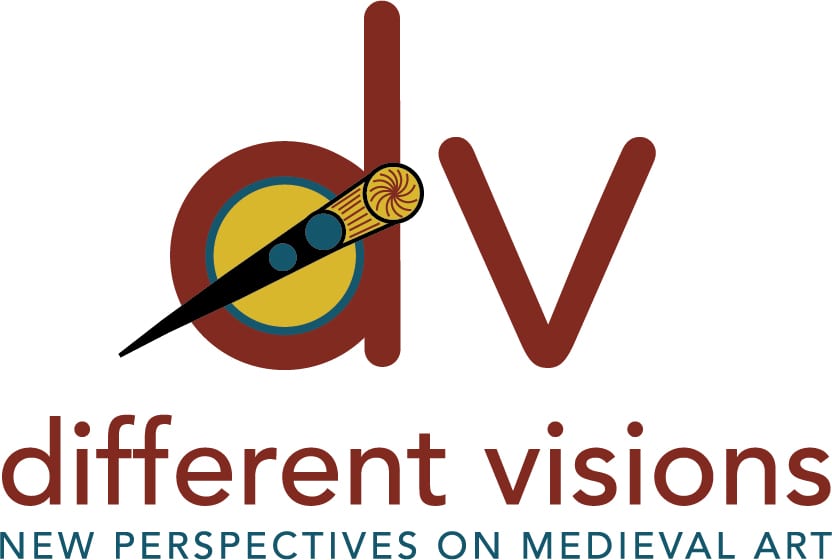
The Material Collective’s participation in the recent BABEL Working Group meeting at UCSB took the form of a special double “session” where we assembled a flash exhibition. During lunch hour, we walked out to the Pacific shore with artists, poets, Oceanducks, and medievalists of all ilks. Our eclectic crew made sound recordings, painted spontaneous watercolors, dove into the waves, took photos and videos, and—of course—collected seashells.
After an hour or so of walking on tarry, kelpy sand, we carried our bounty back to campus, to collectively build, edit, label, frame, hang, install and otherwise curate Things From the Sea. Maura Coughlin, Jeffrey Cohen and Asa Mittman filmed their storytellings of imagined narratives rooted in obscure objects plucked from the sand. They prepared for the walk by writing such narratives about one another’s previous finds, and then winged it on the beach. Back in the cool comfort of the exhibition space, the film was a little, immediate history of discovery.
Sakina Bryant and Karen Overbey draped themselves in seaweed, becoming ocean, speckled in sand; Karen collected tar — the relics of decades of shoreline drilling — and rolled it into neat balls, placed under glass like scientific specimens. Emily Gephart and Elliott Ihm built hybrid creatures: lobster-tailed, bird-winged, tentacled things, somewhere between medieval entrements and Surrealist sculptures.

Karen with her tar collection, and Caliban make-up
In the subsequent plenary on Scale, Asa carried the fundament of the beachwalk forward in a piece co-written with Ben Tilghman on “Sand” (to be posted soon!). Maggie M. Williams also spoke about how sand aggregates into stone, which in turn erodes back into sand, in one of her continued musings about the medium of Irish high crosses.
The beachwalk and its subsequent exhibition encouraged many of us to think about process: the process of planning, the process of working along verses working together, the process of working together across time and space. These ideas also played out in several other sessions in which Material Collectivists participated. Marian Bleeke spoke in “Beachcoming,” a session for which participants worked together ahead of time to create related online exhibitions that were in dialogue with one another. Marian’s presentation concluded with a request that we all try to talk more about our processes, and that we try prioritizing process over product (you can read the presentation text and access the exhibitions here). In the session “Marooned” Jennifer Borland and Louise Siddons considered process as well, advocating against the scholarly inclination to either worship or reject theories for a more moderate approach in which we keep a lot of theories around and see what seems useful. All these theories were likened to lifeboats that might come in handy at a later point in one’s thinking or writing, and they concluded with the plea “Don’t be the Titanic!” And in “Transatlantic/Transtemporal,” Jennifer Borland worked with four other session-mates to create a collaborative performance around objects that have moved across the Atlantic and across time (read Jen’s write-up of that session here). This session also led to more thinking about process, for the takeaway was as much about finding ways to collaborate across the vastness of disciplinary and period oceans as it was about other forms of movement.
The attention to process and to collaboration that links all of these Material Collective endeavors at the conference are surely the result of the Babel Working Group’s encouragement to experiment not just with presentation styles and session formats, but also with the fundamental processes of research. Released from the pressure to produce, we were better able to think, to walk, to enjoy.
And to let our thoughts mingle together. In that spirit, Marian Bleeke wove this poem out of stray thoughts gathered at Babel – the flotsam and jetsam of the conversations, if you will:
Please know that it is the ocean That commits us to making sense of the world, Pitching for rescue against a future catastrophe. An ocean of violence, too big to understand. The refugees that we will all be: The lesser monsters, the users without means. Indigenized uninhabitants on cloud feudalism. For now we inhabit a metaphor: the sea as a commons, Always flowing the same way. With shared vulnerability, abundant physicality, Unprogrammable input and eerie nearness. It is a poetry generator: sampling the sea. Finders and founders juxtapose and shift Invisible things, cultures of whales, Trees above the cloudlines And persistence over time. We are the future of the sea. Reclaiming education. Smuggling hope. Producing pleasure.